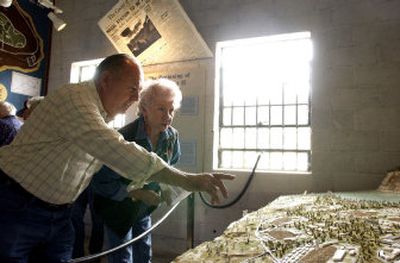Farragut sailors reunite

Navy blue baseball caps dotted the crowd that gathered Friday.
They covered salt-and-pepper, white and gray heads.
The hats, commemorating the Farragut Naval Training Station, came off during the Pledge of Allegiance and national anthem. They moved in rhythm with the march song. And cast downward when taps played.
Many were decorated with year tags, announcing how many reunions the wearer had attended. Some had only one or two; others had upward of a dozen.
One more tag can now be added.
This weekend is the 19th annual get-together of World War II veterans who trained at Farragut Naval Training Station in Athol. From 1942 to 1946, about 300,000 servicemen passed through there.
About 300 to 500 of them attend the reunions.
“They’re on walkers, they’re on oxygen, but they still come,” said Al Leiser, the reunion host, as he motioned to the former sailors who sat on lawn chairs, tapping their feet to old country-western tunes.
Leiser was the assistant manager of Farragut State Park for 23 years and saw many men coming back to see their base. He learned of an informal reunion of veterans in Sandpoint and invited them to gather at the park, where their service in the Navy began.
“This was their rite of passage,” Leiser said. “This was where boys became men.”
George Dehaan, 77, can hardly believe it’s been 60 years since he left the Navy. “It’s mindboggling,” Dehaan said.
He drove to the reunion, his 17th, from Puyallup where he lives with his wife of 54 years.
“I don’t know if I was happy the time I was there,” Dehaan said of his time in the Navy. “But when you look back on it, it was actually rewarding.”
Tom Reilly, 78, of Orofino, is one of the handful of people who can still fit into their uniforms. He wears it proudly, explaining the badge that indicates he was a ship’s cook.
He and his wife enjoy dancing to the “old time music” that plays at the reunions.
“I’d never dreamed I’d be coming back to this place,” Reilly said. “It really brings back memories of so long ago.”
He remembers the black, cobble-stoned paths he marched on every morning and evening. He remembers how his ship crossed the Pacific seven times, the Panama Canal three times and the Atlantic twice. He remembers how skinny the Japanese prisoners of war on his ship were.
Of course, these sorts of gatherings are prime venues for story-swapping.
Bob Todd, 79, of Spirit Lake, jokingly tells the tale of how he single-handedly ended the war. He was due to be sent to Europe, but Germany and Italy didn’t want him there so they surrendered.
So he went farther east. Then when the Japanese found out he was on their land, they surrendered, too.
Todd has never encountered anyone from his company at these gatherings, but he enjoys meeting new people.
His voice shakes as he recalls his contemporaries who die every year.
“We miss ‘em.”
Even though they might not have known each other in their youth, he said, their common experience binds them.
“We’re all brothers.”